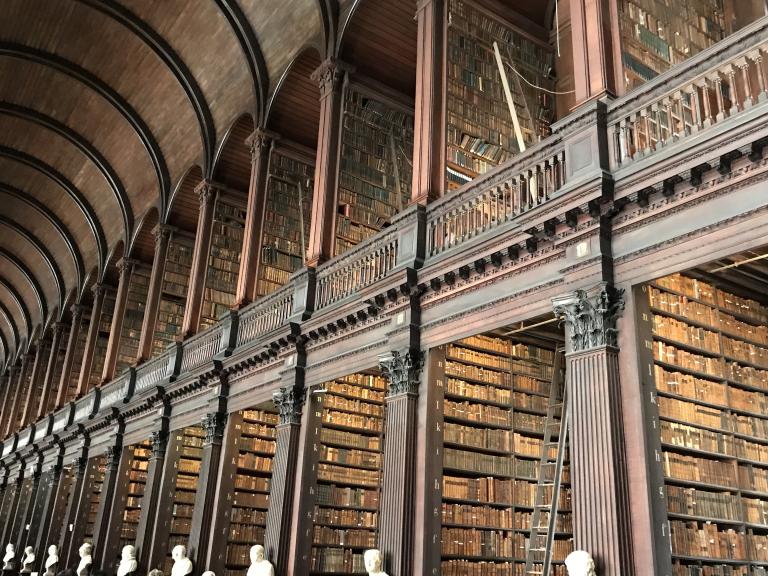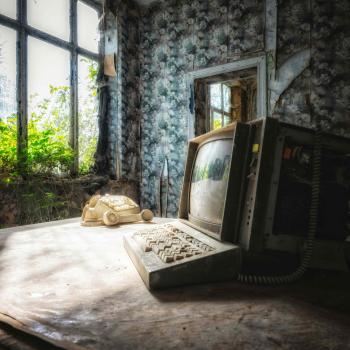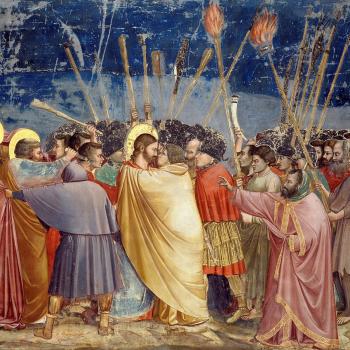 An Interview with Peter Hamilton-Giles of Atramentous Press
An Interview with Peter Hamilton-Giles of Atramentous Press
I do believe it is important for practitioners to question their own narrative, their own beliefs, if nothing else to ensure they are not slavishly following the doctrine of another.
Peter, together with his partner and talented artist Carolyn, is the founder of Atramentous Press, an imprint producing beautiful works of serious exploration into the relationship with the Witch. He is a scholar of Anthropology and Religious Studies, with a background in occult practices that inform his fascinating writings. A review of The Witching-Other: Explorations and Meditations on the Existential Witch together with Standing at the Crossroads: Dialectics of the Witching-Other will follow soon. In the meantime, it is an absolute pleasure to be able to share the following interview which Peter was kind enough to participate in.

Ian Chambers (IC): Could you start, perhaps, by just giving us a brief biography of your involvement with the occult to date and how you came to establish Atramentous Press?
Peter Hamilton-Giles (PHG): Well, my involvement with the occult world commenced in the 1980s when I undertook the Typhonian O.T.O. probationary period. When it came close to completing this 9 month practice, I realised that I did not require any masters, and so it was that I came to know that my path was designed for another purpose. It wasn’t long after that I became fully immersed in the Haitian Vodou tradition, this fascination would, a decade later, find me travelling to Haiti a few times to find out more. Amongst all these happenings, I became close friends with Andrew Chumbley, and although I was never involved in the Cultus Sabbati, I came up with the idea that we might establish an Ophidian Tradition based around using the constellation of Draconis. The primary reason for this particular focus was that it not only resonated with our sorcerous constitution, but also established a direct link back to when Draconis contained the northern star 3,000 years ago. Such was the connection between us that over the next few years we devised a working body of sorcerous material that would eventually emerge, albeit edited, as The Dragon Book of Essex. By the time the book was published I had already started to write for Three Hands Press, having come to realise I had a practitioner’s perspective that was often at odds with the general occult consensus on how things should be done. This eventually led to forming our own publishing co. Atramentous Press in 2016 and since then we haven’t looked back.
IC: You are the author of two books in a three volume work, as I understand it, addressing the Witching-Other. In a statement on this, you indicate that it is hoped that these help to challenge and assist the reader in transcending their understanding of the witch. Why do you feel this is important?
PHG: The primary reason for why I came to understand witchcraft in a way which continues to remain unexplored is due to my interest in occult philosophy. For here it is the theoretical stance which informs how one addresses witchcraft. Having read many of the texts on the subject, from the position of academic to those written by practitioners, I came to understand that there is so much which remains unsaid. These silences I explore by using the idea of Otherness. This has allowed me to open the realm of the hidden. By using an existential perspective I have then pulled this towards the Self so that we might understand our relationship to the witch better. Why this is important for the practitioner is due to many being quite content to simply follow stereotypical representations in an almost slavish way. What I suggest is that practitioners take the time to question the very nature of their relationship towards the witch by addressing what remains absent rather than what is present.

That there is in fact an implicit Othering in what we do, how we then relate to the witch must derive from something Other than that which has been recorded.
IC: Your writing is at times difficult and requires a level of philosophical understanding on the behalf of the reader. What has been your background in this regard, and which informs your writing?
PHG: When I first began reading and writing about philosophy, I found it incredibly hard to first comprehend and then convey its meaning. However, I came to realise it is not philosophy per se which is hard to understand but rather finding the correct or most suitable approach by which to convey meaning. For me, this has meant employing phenomenological and hermeneutic approaches, something which I became interested in while studying anthropology and religious studies. I found both of these created meanings and insights which I would have otherwise missed. What I like about of these philosophical approaches is that they are designed to challenge the obvious, and thus gives the curious mind the opportunity to become fully immersed in the substrate of the imperceptible. Particular philosophers I like to use are Edmund Husserl, Merleau-Ponty, Levinas, Gadamer, Bachelard, and Ricouer, along with contemporary philosophers like Dylan Trigg and Dan Zahavi. The primary anthropologist I look to for inspiration is Michael D. Jackson, who teaches at Harvard University. Now, I can’t say that any of these have addressed the topic of occultism, and yet I found it possible to adapt and apply their reasoning to occult scenarios.
IC: How would you describe your relationship with witchcraft, i.e. as practitioner, theoretician?
PHG: Both, we have a large shrine in our home which in some way operates as a narrative of my occult course across the decades. I do find now that I am largely drawn towards the theoretical side of things but that is because this is a spiritual course in and of itself.
IC: You coined the term ‘Existential Witch’ in your first book, The Witching-Other. Perhaps you could summarise the term a little.
PHG: Existentialism is about that which relates to the individual, in particular the existentialist looks at the surrounding world so as to gain a sense of purpose and identity. This is why you often hear the term that a person is having an existential crisis. It may be because I have a curious mind, but I am interested in how we orientate ourselves to those things which in part are external to ourselves. In this way, it becomes possible to gather accoutrements that express who we are. From this it is then possible to examine exactly what is there of the witch that practitioners identify with, while asking how does this contribute when there is so much which is unwritten, imagined, or silent? That makes for an interesting topic and makes for the Existential Witch.
IC: Through your study, you expand and explore through Existentialist Phenomenology at times, culminating in what you term the ‘Witching-Other’. Briefly, what is meant by this term?
PHG: The Witching-Other is, as I have already mentioned, the culmination of a relationship with a character that is only ever partial, yet it is this apparent lack in detail and meaning by which people have built a venerable belief system. While some witch orientated practitioners may baulk at the suggestion, what most are doing is culturally appropriating many centuries worth of partial narratives, all of which conceal the complete story. This is the reason for the acculturation in the first place. However, with the Witching-Other I go to the heart of the matter, what we do know is that we do not know very much! That there is in fact an implicit Othering in what we do, how we then relate to the witch must derive from something Other than that which has been recorded. Accordingly, the witch is not exactly a witch, but is rather placed in motion from records related to having undertaken specific deeds. This creates the doing “Witching” while the silences and absences in the text create the Other.

It is therefore from what we don’t know, rather than from what we do which allows us to open ourselves up to possibilities and the development of belief.
IC: In The Witching-Other, you look to deepen the relationship between the occult student and the witch, broadening the vocabulary by which we may apprehend that quintessential Otherness. Yet, you maintain that it is in the unsaid, the silences, that the Witching-Other appears. Perhaps you might be able to provide a suggestion of how you hope this understanding to benefit the discussion of modern witchcraft?
PHG: This is an exceptionally good question! The premise is relatively simple, if we agree that the witch in part remains unknown to us, that it is indeed the act of doing or having done something which identifies a person, past or present, then it is not the witch alone but his or her connection to Otherness, to the silences, absences, and censorship in texts which gives us license to use our imagination. It is therefore from what we don’t know, rather than from what we do which allows us to open ourselves up to possibilities and the development of belief.
IC: There’s currently a popular renaissance in modern witchcraft, for better or worse, and it is a trend that is perhaps altering the meaning of the witch culturally. Do you feel that this is impacting our interpretation of the witch?
PHG: There is definitely a double edged sword on how people apply themselves existentially to the witch. Popular culture continues to define and conform to stereotypes and as a result people appropriate this so that they can declare their sense of difference from main stream society. At the more serious end, the practitioner may attempt to do something very different and yet without questioning contingencies which pre-figure the course of action, it is almost impossible to not end up almost at the same place as the populist witch approach. The only way to possibly stop the cycle is to question and study the formation of contingencies, so that one might understand how the relationship between the existential witch and the self develops.
IC: Your contribution to the explosion of literature pertaining to witchcraft is of a different kind to the popular books bulging the bookshop’s metaphysical shelves. Your own writing spans the academic and philosophical world into the thinking and metaphysical witch. How would you place your work in the current milieu and who is your desired readership?
PHG: This is a particularly difficult question to answer. Do I have a readership in mind? Not really. I do believe it is important for practitioners to question their own narrative, their own beliefs, if nothing else to ensure they are not slavishly following the doctrine of another. The occult world is meant to be made up of free thinking, ingenious individuals, who one way or another find a path which allows them to consolidate their own beliefs, while leaving enough room for them to scrutinize existing, taken for granted precepts.

IC: You are one of the co-founders of the Dragons’ Column and worked with Andrew Chumbley. His name still commands attention and has an aura of mystery amongst the community of those who follow his works. What was your relationship with Andrew and what was he like as a magician, witch and friend?
PHG: I do consider Andrew to be a true brother of the Dragons’ Column since we began the work together sitting by a babbling brook close to where his grandmother lived in Essex. Our mutual interest in Eygptology, Haitian Vodou, the Typhonain O.T.O., as well as the mystics of India and Nepal, meant that we naturally had a lot in common. Given our commonalities we were also cast out by many who accused us of working with the Devil, yet that was never the purpose of our interest. Early on in our friendship we began to work together, this being prior to the setting up of the Dragon’s Column. While writing Azoetia Andrew would offer me to read extracts while seeking advice and so it was that a mutual trust and respect for one another grew across the proceeding years. Indeed, I was his primary outlet for selling Azoetia when it was first published, and I can tell you it did not go down well with the witching fraternity. Andrew is one of the only people I have met who became truly inspired by the metaphysical, (I would say the contemporary artist David Herrerias is the only other person I have met with the same qualities). Andrew operated as a conduit for entities from beyond this world such was his daily commitment to the Greater Work. Andrew was a demure fellow, but once placed within the confines of a circle he could command and choreograph in a manner which I have rarely seen. He had a wicked sense of humor, with there being many “jolly jape” moments being performed by both of us while under the auspices of the event being a ritual. Such was our closeness that I even acted as a reference when he applied to go to university. In later years we lost touch, we ran into each other outside of Tesco before he died, he discussed with me that he was having difficulty in understanding Foucault. This prompted a final email to him which gave some guidance on how he might find a way through the Foucault maze. I should add, as I have turned to my own writing projects that I have come to value and miss Andrew even more, I feel there is so much more we could have done together. Alas, it was not to be…
[The Book of Q’ab iTz, by David Herrerias, is part of a series of books from Atramentous Press exploring the subject of the Dragon’s Column, this being the cohort who contributed towards the work that eventually became The Dragon Book of Essex by A. D. Chumbley.]
IC: Can you give an indication of the title and subject of the third volume in your work on the Witching-Other, when we can expect it and how to order your books?
PHG: The third volume I have as yet to write, there are some considerations I would like to include such as the subject of the witches’ sabbat which in itself generates a lot of interesting possibilities. However, in the main the final volume will examine witchcraft and narrative. This currently has the working title of Narratives in Witchcraft: Interpreting the Witching-Other Perspective
IC: My sincere and considerable thanks to Peter for taking part and I look forward to your future projects.















